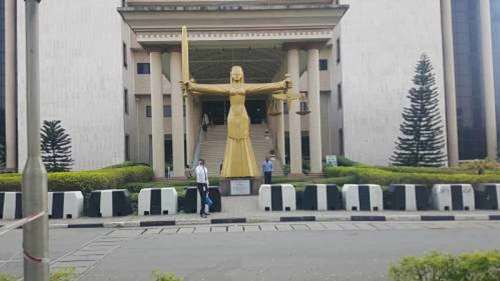In a legal tussle concerning the construction of the Lagos-Calabar Coastal road project, Justice Akintayo Aluko of the Federal High Court in Lagos ruled against a group of plaintiffs contesting the project’s encroachment on their properties. The plaintiffs, comprising community leaders and concerned property owners from Okun-Ajah in Eti-Osa Local Government Area, Lagos State, had initiated a lawsuit against the Federal Ministry of Works and Housing, the Lagos State Government, and the construction company, Hitech Construction Limited, seeking an injunction to halt the project and claiming damages for alleged trespass.
The plaintiffs’ primary contention revolved around the project’s impact on their land, alleging encroachment and demanding the court to set aside the project’s designs and plans affecting their properties. They specifically sought an order restraining the defendants from further encroachment and trespass, aiming to divert the construction away from their land holdings. Their claim for damages stemmed from the alleged acts of trespass already committed, seeking compensation for the perceived infringement on their property rights.
However, the defendants, represented by a team of Senior Advocates of Nigeria, countered the plaintiffs’ claims by raising preliminary objections challenging the Federal High Court’s jurisdiction over the matter. They argued that the subject matter of the dispute fell outside the purview of the Federal High Court’s jurisdiction and should be appropriately handled by the Lagos State High Court. This jurisdictional challenge formed the crux of the legal arguments presented before Justice Aluko.
Justice Aluko, after careful consideration of the arguments presented by both sides, ruled in favor of the defendants, upholding their preliminary objections. He determined that the Federal High Court lacked the jurisdiction to adjudicate the case, concurring with the defendants’ argument that the matter fell within the purview of the Lagos State High Court. Specifically, he highlighted that the issues at hand pertained to land disputes and property rights, matters typically adjudicated by state high courts.
Despite ruling against the plaintiffs on jurisdictional grounds, Justice Aluko heeded the plaintiffs’ counsel’s alternative request to transfer the case to the appropriate court rather than striking it out entirely. Citing Section 22(2) of the Federal High Court Act, he affirmed the court’s power to transfer cases to the appropriate jurisdiction when such jurisdictional issues arise. This provision empowers the court to transfer cases to the relevant state high court or the Federal Capital Territory High Court, ensuring that the matter is heard by the appropriate judicial body.
Consequently, Justice Aluko ordered the transfer of the case to the Lagos State High Court, deeming it the proper forum to handle the dispute. This transfer ensures the continuation of the legal proceedings within the appropriate judicial framework, allowing the plaintiffs to pursue their claims within the court possessing the necessary jurisdiction. It also underscores the court’s commitment to ensuring access to justice while upholding the principles of jurisdictional propriety. The case now awaits its hearing in the Lagos State High Court, where the substantive arguments regarding the alleged encroachment and damages will be addressed.














